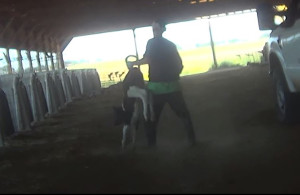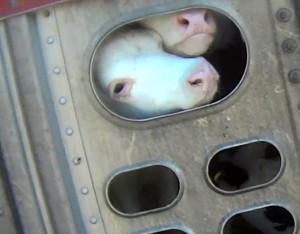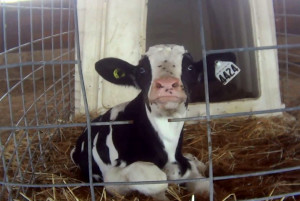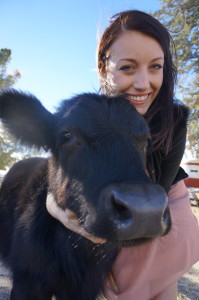But when Radig walked into the sheriff’s office to provide a formal statement a few months ago, the police turned around and told her that she, the whistleblower, was also being charged with animal cruelty for her investigation.
It’s an unprecedented prosecution, and part of the growing crackdown on undercover investigators.
I spoke with Radig about her video, the case, and what this means for “ag-gag” laws:
Can you tell us about your experiences as an investigator at Quanah Cattle Company?
RADIG: Like anyone else looking for a job, I searched and applied at farms that were hiring. This summer I found a temporary general labor position at a calf ranch in Colorado called Quanah Cattle Company. After a brief interview and drug test, I was  hired. This company purchases newborn calves from surrounding dairy facilities and temporarily confines them before shipping them out to be raised for their meat.
During the investigation, I would wake up around 3 A.M. to get ready and make sure my hidden camera was working. I typically arrived at the farm before sunrise, between 4-5 A.M. One of my main jobs at Quanah was bottle-feeding. The calves that Quanah buys from local dairy facilities are taken away from their mothers almost immediately after they’re born, which would naturally be a time they would feed from their mothers. I would feed them twice a day with replacement milk, a task that took a fairly long time. The milk that Quanah received would often be a light pink color. I later found out that the milk we received was from cows that had mastitis, which is an infection of the udder. I was told that the pink color I was seeing was blood from infected udders. The work at Quanah was physically exhausting, but my day was brightened during eating time. The calves would curiously come out of their small hutches to greet me, and would always suck on my fingers, looking for the bottle. I would try to find small moments of my day when no one was around to play with them, which usually took place when a calf squeezed out of his hutch. They would often find me; chasing after me because they started to recognize me, and I smelled like their mother’s milk.
| “They would often find me; chasing after me because they started to recognize me, and I smelled like their mother’s milk.” |
My other tasks were mostly manual labor, and depended on what needed to be done. Some days I would clean out barns, power wash and move hutches, other days I would go to local dairies with my co-worker to pick up new calves. On the instruction of my supervisors, I also gave antibiotic shots to calves that had infections even though I wasn’t given any formal training by the company regarding the proper way to administer shots. I was only casually warned by my supervisor not to get the vein because they calves would die.
 The abuse I documented at Quanah was both egregious and a regular occurrence. I witnessed workers violently drag calves by their limbs, kick them in the back, pull them by their ears, lift them by their tails, and flip them into trailers, resulting in them continuously landing on their necks. Even my supervisor partook in the abuse, and encouraged me to handle them roughly to speed up the loading as well. I quickly learned to make excuses for getting out of following those orders. I think my refusal to partake in any of the abuse resulted in me looking like a lazy worker, that to them was “slow.†All of the abuse these calves endured was utterly unnecessary, and happened out of sheer laziness of the workers, and a failure of the company to oversee the facility. A vast number of the calves were sick while I worked at Quanah, which resulted in many of their deaths. I’ll never forget my first day when my coworker called me over to show me a very small calf that he said was blind. The calf appeared to be extremely weak, and had even more difficultly walking because of his blindness. I witnessed my coworker repeatedly kick the calf to get him to stand, and throw him in the trailer like someone would throw trash in a garbage can. There were other calves that arrived at the facility with deformities in their hooves, making it almost impossible for them to walk correctly. Although the workers realized this, they still pushed and kicked these disabled calves off the trailers.
The abuse I documented at Quanah was both egregious and a regular occurrence. I witnessed workers violently drag calves by their limbs, kick them in the back, pull them by their ears, lift them by their tails, and flip them into trailers, resulting in them continuously landing on their necks. Even my supervisor partook in the abuse, and encouraged me to handle them roughly to speed up the loading as well. I quickly learned to make excuses for getting out of following those orders. I think my refusal to partake in any of the abuse resulted in me looking like a lazy worker, that to them was “slow.†All of the abuse these calves endured was utterly unnecessary, and happened out of sheer laziness of the workers, and a failure of the company to oversee the facility. A vast number of the calves were sick while I worked at Quanah, which resulted in many of their deaths. I’ll never forget my first day when my coworker called me over to show me a very small calf that he said was blind. The calf appeared to be extremely weak, and had even more difficultly walking because of his blindness. I witnessed my coworker repeatedly kick the calf to get him to stand, and throw him in the trailer like someone would throw trash in a garbage can. There were other calves that arrived at the facility with deformities in their hooves, making it almost impossible for them to walk correctly. Although the workers realized this, they still pushed and kicked these disabled calves off the trailers.

Seeing this amount of abuse, on top of being physically exhausted after a 12-hour workday, makes the job of undercover investigations extremely difficult. Due to the sensitive nature of investigations, no one other than my legal counsel knew what I was going through, which was one of the hardest aspects of my job. This is all on top of making sure I didn’t blow my cover with one misspoken sentence.
How did you learn about the charges against you? (Can you tell about being called into the station, answering questions, etc.)
RADIG: Prior to the public release of the investigation, Compassion Over Killing and I gave my evidence to the Weld County Sheriff’s Office. Only a few days after this, we were informed about the criminal charges being brought against three workers at the farm. I was told that I would need to give a formal statement and have my identity verified in person in order for them to move forward with the cases against the three other workers, since I was the only eyewitness. Although we had already furnished a lot of evidence and legal research, Lisa Winebarger, legal counsel for COK, and I agreed to meet with them to help them with their cases.
When we arrived in Colorado, I still wanted to keep my identity as anonymous as possible. I pulled my hair back, put sunglasses on and kept my head down as I walked into the Sheriff’s Office. The Detective we met with purported to understand the sensitivity of this case, and said that although he could make no guarantees because of Colorado’s open records laws, he would do what he could to attempt to keep my identity protected to the extent possible. Ultimately, of course, the Sheriff’s Office actively sent my name and mug shot to over 100 media outlets – clearly there was never any real intent to guard my identity despite legitimate safety and security concerns we voiced repeatedly.
| “It all felt like a twisted nightmare…” |
In the interview, after outlining the basic facts of the investigation, I was asked about the abuse I documented, and questioned as to why I didn’t report the abuse immediately. I reiterated that I needed to establish a pattern of abuse to ensure it wasn’t an isolated incident, and that if I came forward prematurely, the case would have been dismissed by law enforcement. I also reminded him that I was called in to work sporadically, and worked very few “transport†shifts, when the vast majority of the abuse was occurring.
At the end of the interview, the Sheriff walked out and came back with a small rectangular sheet of paper. He informed me that I was being charged with animal cruelty for failing to report in a timely manner, and would need to go to the jail to take mug shots and be finger printed.
What was your reaction?
RADIG: We went in knowing the law and knowing that I didn’t break it – I knew there was no mandatory reporting law in Colorado, and that someone in my position cannot legally have a legal duty to act. But the officer didn’t care about our arguments or the law. All he had to do was say he had enough for “probable cause.†It all felt like a twisted nightmare; I witnessed and reported animal abuse, flew into Colorado to facilitate the cases against the other three, and now was being charged with a crime myself. Most frustrating, though, was that Quanah’s management, who does have a duty in all of this, and who permitted all of the abuse to happen by inadequate training and oversight, is facing no consequences. I think that really reveals the Sheriff’s Office’s true motives.

Part of the allegation is based on not reporting the abuse immediately. Can you explain why, as an investigator, it is important to collect evidence beyond the first instances of cruelty observed?
RADIG: One of the most important aspects of investigations is to establish a pattern of abuse, so we can prove to law enforcement that the documented abuse is not just an isolated incident. If I had come forward immediately like the Weld County Sheriff’s Office wanted, the routine abuses at Quanah would certainly have been swept under the rug. It’s important to note, that despite what the Weld County Sheriff’s Office is suggesting, there is absolutely no legal requirement in Colorado that one come forward with evidence of animal cruelty, much less within any specified period of time. I think it’s also worth mentioning that my citation notes that my “offense†occurred precisely between my first and last day at Quanah. To me this shows that wearing a hidden camera at all, even on my first day, is what bothered them.
What are the potential consequences of this for you, both personally and your work?
RADIG: One of the hardest parts about this situation for me personally, is knowing my career as an undercover investigator is over. I never wanted my identity to be publicized, because this isn’t about me, it’s about catching animal abuse. However, despite our repeated requests for them to treat my case with sensitivity and protect my identity (at least initially), they went ahead and sent my mug shot to over 100 media outlets, and plastered my face everywhere they could think of. You can even find my mug shot on the WCSO Facebook page, with no mention of the other three that were cited, much less any other recent arrests.
I’m in school right now, and finishing up my degree in philosophy and biblical studies. If I’m convicted as unlawfully as I was cited, I could spend my last semester in jail. In addition, I would have to explain to future employers about the animal cruelty charge, because it will show up on a standard background check. However, I know everything I did was within the law, and we’re not going to take this lying down. Public outcry about the absurdity of my charges has been overwhelming, especially in Colorado. I want everyone to see what I’ve seen, so we as consumers can start to make some real changes in what we are willing to support and not support. Interacting with many of the animals during my investigations and the amount of abuse I’ve witnessed, I don’t think there is anything that will stop me from advocating for their humane treatment.
This is clearly part of the larger trend of the industry attempting to silence whistleblowers, such as through ag-gag laws. What do you think is the motivation behind this prosecution? What message is trying to be sent (and is it successful?)
RADIG: The way in which my charge was brought about, and other aspects of how they’ve handled this case, makes us believe my charge is absolutely politically motivated. Just recently, John Cooke has come under fire for choosing not to enforce even modest gun control laws because they conflict with his own personal political feelings about the Second Amendment, despite that it is his job – and that he took an oath – to enforce them. In general, it appears that he only adheres to the laws if it conforms to his political ideologies, which is scary in terms of the position of power he’s in. In fact, he’s currently seeking more power, by running for state office in Colorado.
Every aspect of my undercover investigations was legal. With this being said, it can take a long time to develop cases that lead to a successful prosecution. Their motivation behind my charge has to do with mandatory reporting, something not required in Colorado. However, actual mandatory reporting requirements that are included in “Ag-Gag†bills seek to outlaw the legality of investigations. It’s a threat that compromises consumer knowledge, and will further conceal the day-to-day cruelties and abuse in animal agribusiness. This seems to be their mission: to hide the abuse from the public. If it’s hidden, no one will be questioning their practices; the same practices that cause massive public outcry when these investigations come out. The abuse that investigations expose is extremely difficult, if not impossible, to catch during routine inspections. This is what makes investigations worth defending against these laws.
